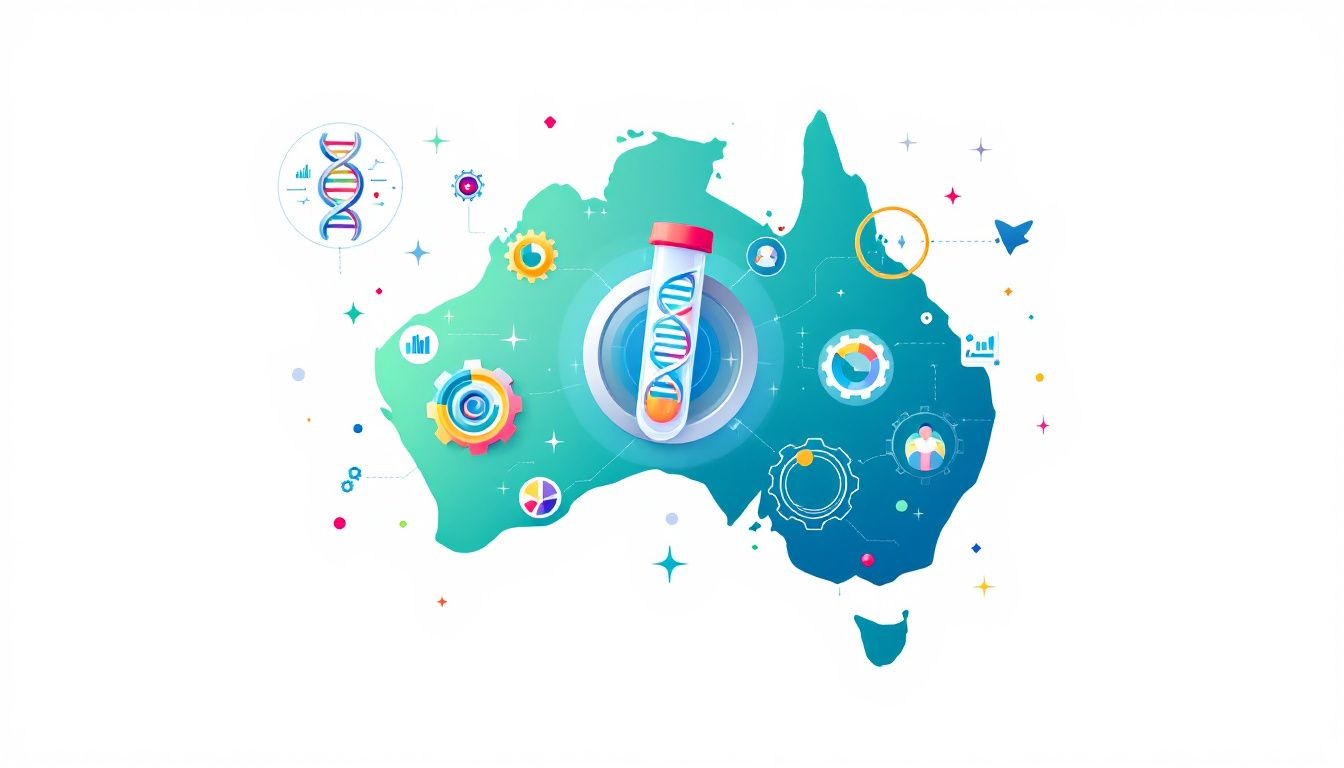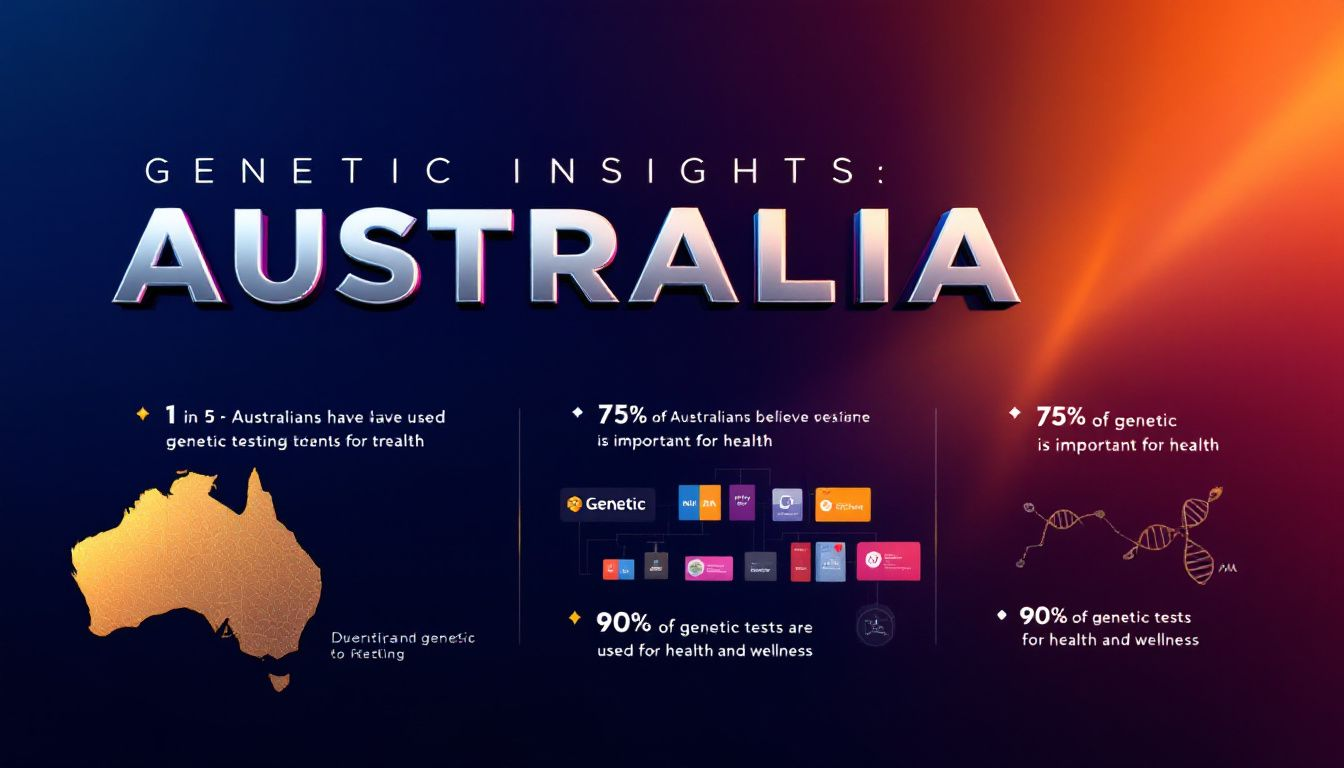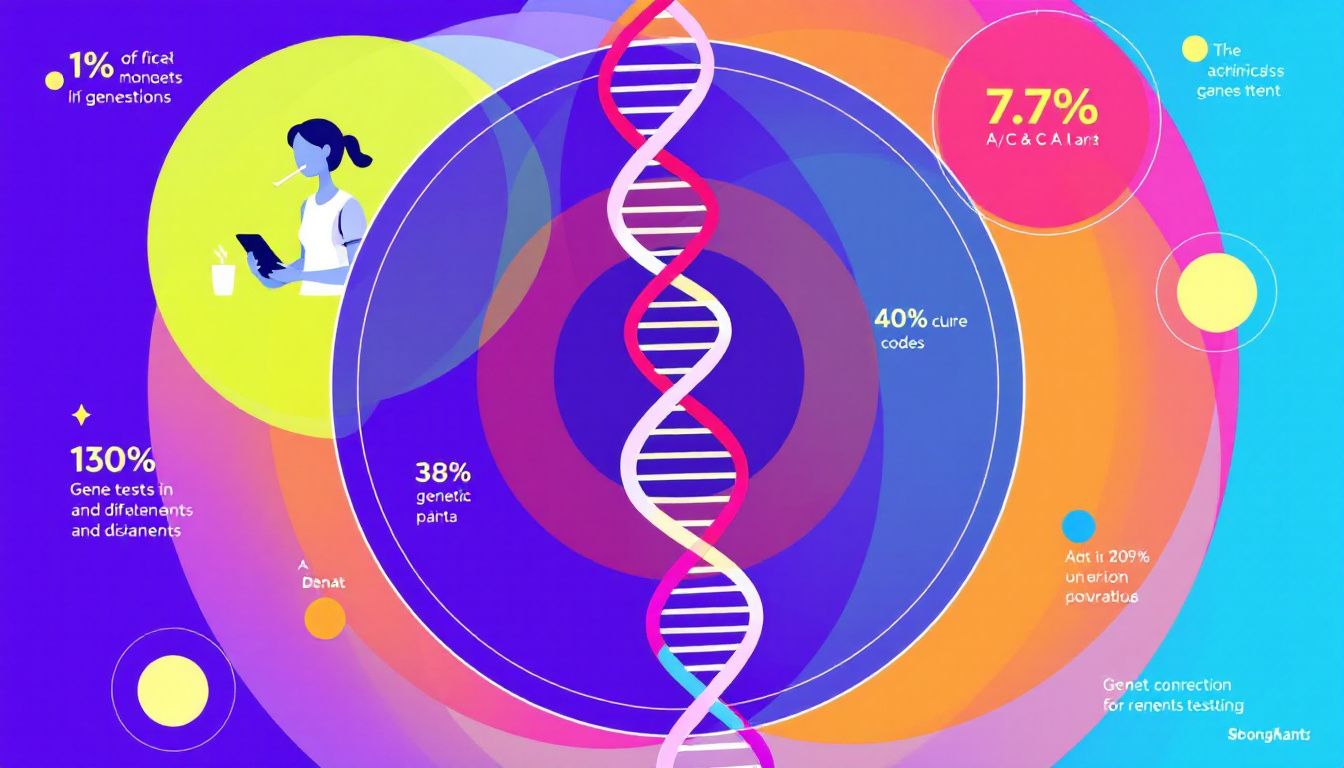Gene testing in Australia can provide vital health insights by identifying genetic risks for conditions like cancer and inherited disorders. This article covers the types of genetic tests available, their benefits, costs, and how to get tested through gene testing Australia. You will also learn about privacy and data security measures to protect your genetic information. Whether it’s for prenatal screening or assessing your own health risks, gene testing can guide your health and prevention strategies.
Key Takeaways
Genetic testing identifies inherited gene mutations that increase disease risk, aiding in early diagnosis, prevention, and personalized treatment.
Australia provides various genetic testing options, including prenatal screening and cancer risk assessment, which empower informed health decisions.
While genetic testing offers significant benefits, it raises ethical concerns regarding privacy and potential discrimination, necessitating robust data protection measures.
Understanding Gene Testing

Genetic testing is a powerful tool in modern healthcare that identifies inherited changes in genes, which can elevate the risk of various diseases, including cancer. These tests analyze your DNA to identify specific genetic mutations that may predispose you to certain health conditions. This information is crucial for early diagnosis, prevention, and personalized treatment plans.
For instance, mitochondrial DNA testing helps diagnose conditions linked to the maternal lineage, which can affect multiple organs and systems. Despite clinical recommendations, only a small percentage of individuals diagnosed with specific cancers undergo genetic testing. This underutilization highlights the need for greater awareness and accessibility of genetic testing services.
Genetic testing not only identifies potential health risks but also provides essential information for family planning and managing inherited conditions. Knowing your genetic makeup can lead to better decisions about your health and that of your loved ones. Genetic counseling often accompanies these tests to help interpret the results and understand their implications, ensuring you are prepared to take the necessary steps for your health.
Types of Genetic Tests Available in Australia

Australia offers a range of genetic tests that cater to different health concerns and stages of life. From prenatal testing to cancer risk assessment and mitochondrial DNA analysis, these tests can provide critical insights into your genetic health. Knowing these options empowers you to make informed health decisions and take proactive measures to protect your future.
Among the most commonly utilized tests are those for prenatal genetic screening, which can detect chromosomal abnormalities early in pregnancy. Tests for cancer risk assessment can also identify hereditary cancer syndromes, enabling early intervention and preventive care. Mitochondrial DNA analysis is also available and is crucial for diagnosing inherited conditions that affect energy metabolism.
Prenatal Genetic Testing
Prenatal genetic testing is an essential tool for expecting parents, enabling the early detection of genetic disorders in the fetus. Non-invasive prenatal testing (NIPT) can be conducted after the 10th week of pregnancy to screen for chromosomal irregularities. This early assessment helps parents prepare and make informed decisions about their pregnancy and the future health of their child.
There are also more invasive methods like Chorionic Villus Sampling (CVS) and amniocentesis. CVS is performed at 11 to 12 weeks, while amniocentesis is done between 15 to 18 weeks of pregnancy. These tests provide a more detailed genetic profile of the fetus and can detect a range of genetic disorders. The information from these tests is essential for planning and managing pregnancy.
Cancer Risk Assessment
Cancer risk assessment through genetic testing can identify genetic predispositions to various cancers, including breast and gastrointestinal cancers. Early detection of these genetic markers enables individuals to take proactive measures, such as increased monitoring or preventive surgeries, significantly reducing the risk of developing cancer.
In Australia, a nationwide DNA screening initiative aims to enhance early detection of hereditary diseases, potentially alleviating pressure on the healthcare system. The DNA screening project focuses on identifying genetic predispositions to cancers and heart diseases, ultimately saving lives through early intervention.
Understanding your genetic disease risk allows you to make decisions that positively impact your future health.
Mitochondrial DNA Analysis
Mitochondrial DNA (mtDNA) analysis is another vital aspect of genetic testing. MtDNA is inherited solely from the mother and is crucial for cellular energy production. This type of analysis is essential for diagnosing a range of inherited conditions, particularly those related to energy metabolism.
The testing process typically involves collecting a blood sample, which is then analyzed in a laboratory for genetic mutations. Identifying mutations in mitochondrial DNA can clarify the cause of certain unexplained medical conditions and enable effective management through a dna test.
Early diagnosis of mitochondrial disorders can significantly improve health outcomes by enabling timely and appropriate interventions.
Benefits of Gene Testing

The benefits of genetic testing extend far beyond the individual tested. It can reveal significant information that affects the entire family, allowing relatives to understand their own health risks and take preventive measures. For example, genetic tests can identify mutations that increase the risk of developing breast and gastrointestinal cancers.
Many individuals who undergo genetic testing report significant changes in their healthcare decisions, resulting in more personalized treatment plans. Positive test results can guide targeted prevention and treatment strategies, ultimately improving health outcomes. Genetic testing can also alleviate uncertainty, helping individuals make informed decisions about their healthcare.
Personal stories illustrate the transformative impact of genetic testing. Sarah, a young mother, underwent genetic testing and discovered a high risk for breast cancer, prompting her to take proactive measures. Experiences like these underscore the empowering role of genetic testing in health management and decision-making.
Risks and Ethical Considerations
While genetic testing offers numerous benefits, it also comes with certain risks and ethical considerations. A primary concern is the privacy of genetic test results. Fortunately, these results are protected and will not be used for insurance purposes, ensuring that your data remains confidential.
The potential for genetic discrimination is another ethical consideration. Although genetic data is stored securely and personal genetic information is protected, there are concerns about discrimination in the workplace and insurance policies. Consulting with healthcare professionals and genetic counselors helps you fully understand the implications of your test results and address any concerns.
How to Get Tested

Getting tested is straightforward and accessible. You can purchase a DNA testing kit online or in a pharmacy to start the process. These kits often include detailed instructions for collecting a DNA sample by swabbing the inside of your mouth. Avoid eating, drinking, or smoking for at least 30 minutes before collecting the sample to ensure accurate results.
After collecting the sample, you fill out the details on the barcode sheet and return the swab in a reply-paid envelope.
From November 1, 2023, Medicare provides rebates for essential carrier screening tests, allowing eligible patients to have these tests at no out-of-pocket cost. For expanded genetic carrier screening that includes more genes, the cost will be approximately $340, with the remaining balance being the patient’s responsibility.
Cost of Genetic Testing
The cost of genetic testing can vary depending on the type of test and its purpose. Here are some examples of costs for different tests:
An ancestryTest Kit costs $99.00 – $149
A 23&me Test Kit costs $149.00 on average
More comprehensive tests, like the complete gene profile that covers over 1300 genes and matches your symptoms to your problem genes analysis, can cost up to $385. This is the gold standard.
Understanding the costs associated with genetic testing is crucial for making informed health decisions. While some tests may seem costly, the potential benefits of early detection and personalized healthcare can outweigh the initial costs.
Interpreting Test Results
Interpreting genetic test results can be complex and usually requires the expertise of healthcare providers. Genetic tests can provide positive, negative, or uncertain results, each with distinct implications for health management. A positive result may confirm a diagnosis or indicate an increased risk for certain diseases, but it does not provide exact risk levels.
Negative results do not always rule out the possibility of a genetic disorder, as they might miss undetected genetic changes. Uninformative DNA results occur when genetic variations found do not correlate with any known health implications.
Genetic counselling is recommended before testing to assess risks and discuss the potential outcomes of the test results.
Privacy and Data Security
Privacy and data security are paramount in genetic testing. Personal information related to genetic tests is stored on encrypted, secure servers, protecting your data from unauthorized access. DNA samples are stored in a secure vault at -84°C and can be disposed of upon request, ensuring that your genetic information remains confidential.
Additionally, personal genetic data is protected after testing and is not shared with anyone. ISO Data Security standards are adhered to, ensuring the highest level of data protection.
Despite these measures, concerns about genetic discrimination remain, emphasizing the importance of robust data security practices and legal protections.
Case Studies and Personal Stories
Personal stories bring to life the real-world impact of genetic testing. Sarah, a young mother, discovered a high risk of breast cancer through genetic testing, prompting her to undergo a proactive mastectomy. Her experience transformed her own health and inspired her to become an advocate for genetic testing, encouraging others to take control of their health.
James’ story is another powerful example. Diagnosed with a hereditary condition, he used genetic testing to understand his child’s risks, which led to early preventive care and lifestyle changes that significantly improved his family history and health outcomes.
These stories highlight the empowering role of genetic testing and its profound impact on health management and decision-making.
Research and Future Developments

Ongoing research and future developments in genetic testing promise to further expand its impact. The national dna screen pilot study targets individuals aged 18-40, aiming to build an evidence base for a nationwide DNA population screening program. Initial public response to DNA screening in Australia has been positive, indicating a strong demand for such initiatives.
Starting with 100,000 people, the goal is to eventually offer free population DNA screening to everyone. This initiative is supported by a significant $3 million grant from MRFF, which is crucial for its progress. Scientists and legal experts are collaborating to develop comprehensive genetic testing strategies to ensure its success.
Paul’s dedication to genetics was inspired by the publication of the human genome sequence in 2000. He emphasizes that many more years of research lie ahead in DNA screening and genetics. These ongoing efforts highlight the potential for genetic testing to revolutionize healthcare and improve health outcomes on a national scale.
Summary
Genetic testing offers invaluable insights into our genetic makeup, enabling us to take proactive steps towards better health. From prenatal genetic testing and cancer risk assessments to mitochondrial DNA analysis, these tests provide critical information that can significantly impact our health decisions. While there are risks and ethical considerations to keep in mind, the benefits of genetic testing far outweigh them, offering a path to personalized healthcare and preventive measures.
As research and technology continue to advance, the future of genetic testing looks promising. With initiatives like the national DNA screening pilot study, Australia is at the forefront of this revolution, striving to make genetic testing accessible to all. Embrace the power of genetic testing today and take control of your future health.
Frequently Asked Questions
Can you get genetic testing in Australia?
Yes, genetic testing is available in Australia, with options such as free DNA testing through programs like DNA Screen from Monash University, which focuses on identifying risks for cancer and heart disease. This testing is crucial for early intervention and treatment.
What is genetic testing?
Genetic testing is the analysis of one’s DNA to detect inherited gene changes that could increase the risk of specific diseases. This process aids in understanding genetic predispositions and informs healthcare decisions.
Is my genetic data secure?
Your genetic data is secure as it is stored on encrypted servers and protected by ISO Data Security standards. Additionally, DNA samples are kept safely and can be disposed of upon request.
What are the costs associated with genetic testing?
The costs of genetic testing can range from approximately $99 for basic tests to around $198 for more comprehensive options. It is important to check for potential Medicare rebates that may apply to specific tests.
What should I do with my genetic test results?
Consulting with healthcare providers and genetic counselors is essential for accurately interpreting your genetic test results and understanding their implications for your health.

